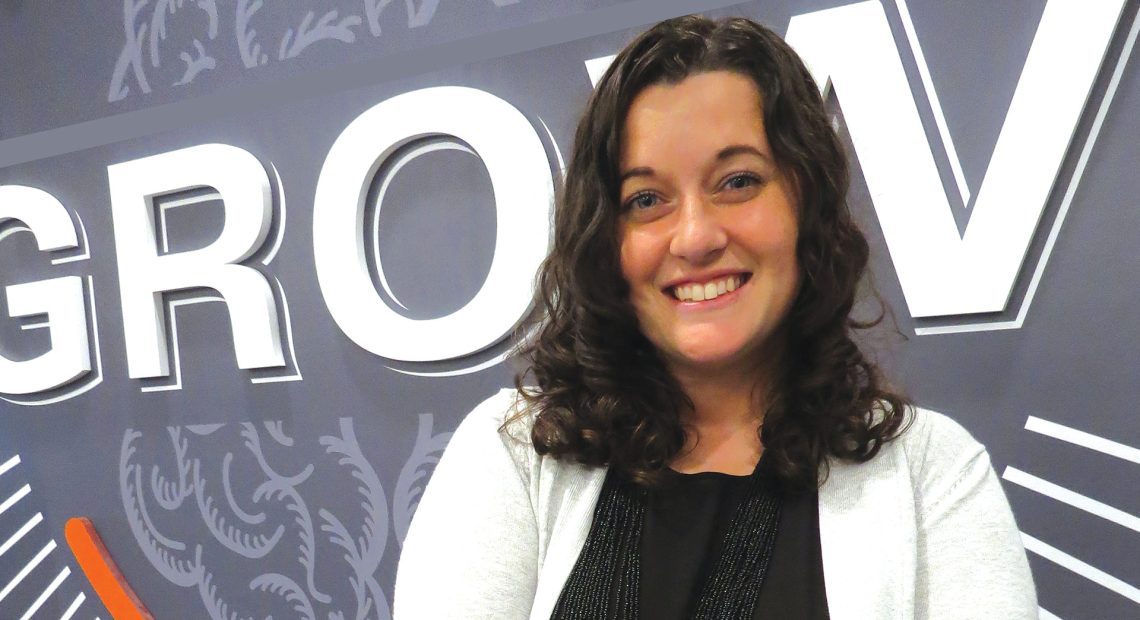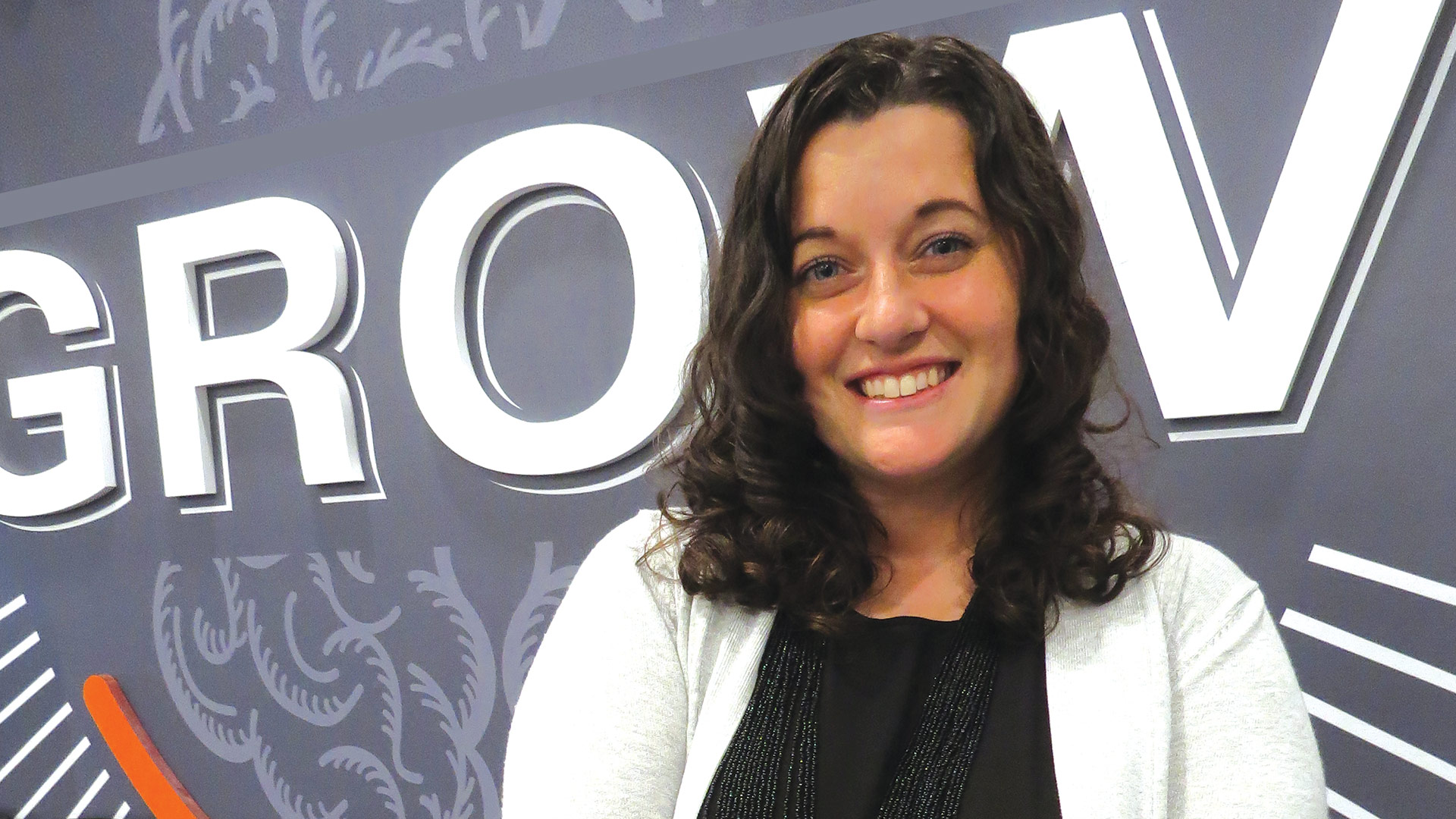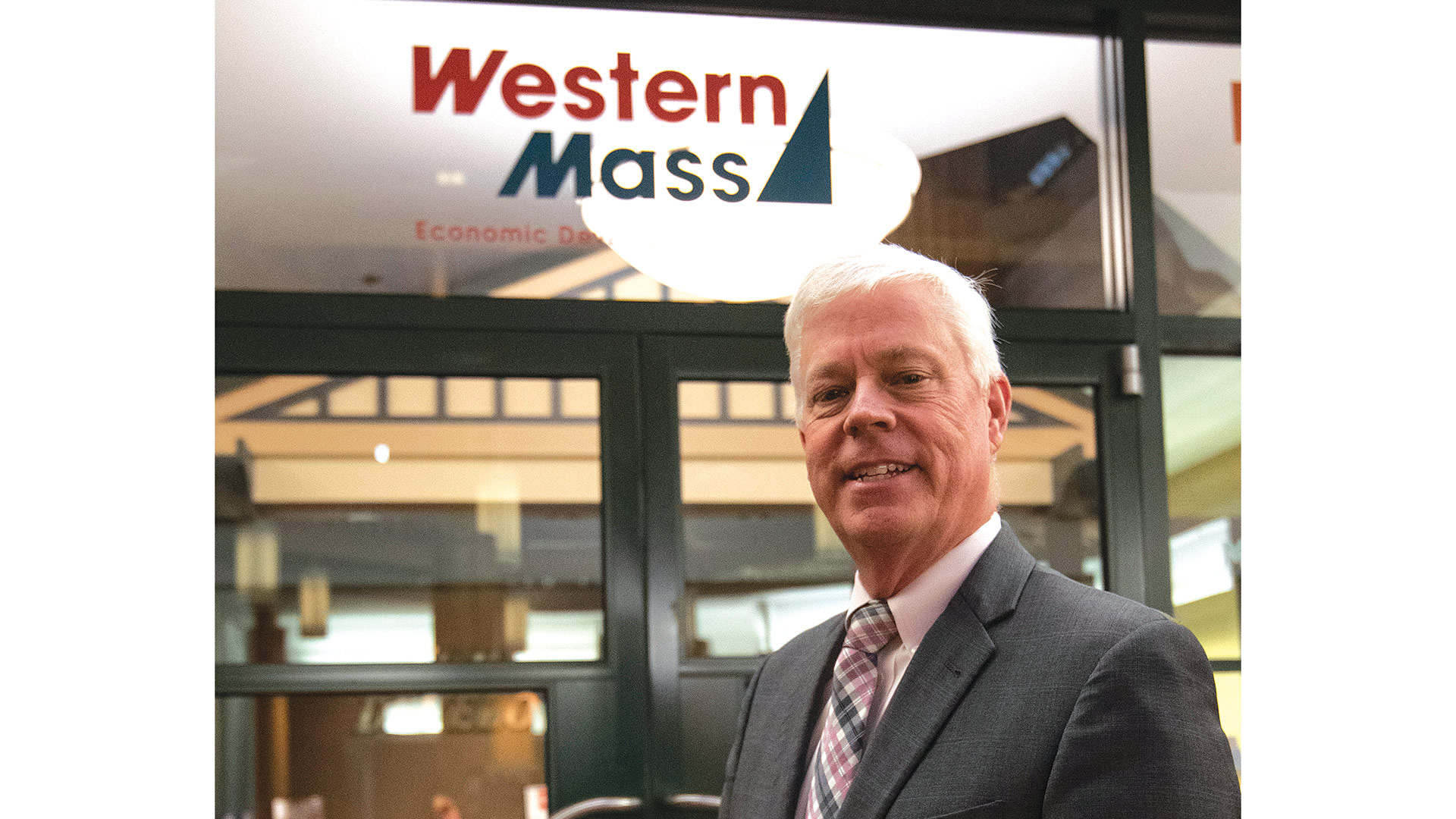
Now Part of the EDC, VVM Continues to Evolve and Grow
The Next Chapter
Valley Venture Mentors has long had a singular but multi-faceted mission — to promote entrepreneurship in the region and provide various forms of assistance to help business owners take their venture to the next stage. Through a new and broader affiliation with the Western Massachusetts Economic Development Council, the agency has an opportunity to become, in the words of its director, even more of an advocate, a champion, and a “convener” within the region’s broad, and growing, entrepreneurship ecosystem.

VVM Executive Director Hope Ross Gibaldi
As she talked about the new, broader, stronger relationship between Valley Venture Mentors and the Western Massachusetts Economic Development Council (EDC), Hope Ross Gibaldi, VVM’s executive director, used the word ‘opportunity’ early and quite often.
She said the affiliation between the two agencies, or the deeper affiliation, as the case may be, gives VVM access to a larger pool of funding sources, some of them stemming from COVID-relief efforts, and, in general, a stronger platform from which to conduct its many programs — from its weekly ‘community nights’ to its student business accelerator to its entrepreneurial roundtables — and become an even more vital component of the region’s entrepreneurship ecosystem.
“VVM has gone through a lot of evolution and many iterations, and with the course of the pandemic, that has really provided us with a chance to do some reflection,” Ross Gibaldi explained. “I think this new alignment with the EDC really positions VVM to be a convener regionally for the entrepreneurial ecosystem and be an advocate and a champion for entrepreneurship in the Western Mass. region. It’s a tremendous opportunity — for VVM and the region.”
Rick Sullivan, president and CEO of the EDC, agreed. He told BusinessWest that VVM, which will continue to be its own 501(c)(3) nonprofit and rely on many of its traditional funding sources, ranging from area foundations to long-time supporter Berkshire Bank, is now a “program” of the EDC, one that must ultimately pay for itself through fundraising, grants, program fees, and more, while taking full advantage of networking and funding opportunities presented by the EDC.
“Our economy here is really reliant on small and medium-sized businesses, many of which are generationally owned — the ownership is here in Western Massachusetts. And that’s what the future is going to be.”
Sullivan noted that entrepreneurship has always been one of planks, if you will, of the EDC’s platform when it comes to economic development. Elaborating, he said regions like Western Mass. can certainly hope to add all-important jobs by attracting major corporations. But a far more realistic strategy is to grow organically, by encouraging entrepreneurship and providing mentorship and several forms of assistance to companies at various stages of development and maturity.
“Our economy here is really reliant on small and medium-sized businesses, many of which are generationally owned — the ownership is here in Western Massachusetts,” he said. “And that’s what the future is going to be. A Fortune 50 company is not likely to build its headquarters here — our strength is the small-to medium-sized company that stays local, invests local, hires local, uses a supply chain that is also local. Do we all sit and hope that one of these companies that goes through VVM gets really big and stays here? Sure, but that is not the model.”
This explains why the EDC has always maintained a healthy relationship with VVM and why it has now made the agency one of its programs, or affiliates.

Rick Sullivan says that promoting entrepreneurship and supporting the startup community is vital to the Western Mass. economy, which explains the affiliation between VVM and the EDC.
“The founders of VVM did a masterful job of getting it here and recognizing the importance of the startup community and small-business growth and the importance of that to the Western Mass. economy,” Sullivan told BusinessWest. “We’re building off that leadership and vision and bringing in here. And I think it does align perfectly with the EDC, because it [VVM] is really looking to bring all the resources together for a common goal and put everyone under one umbrella. So I’m optimistic about the future of VVM.”
VVM now joins several other affiliates of the EDC, including the Springfield Regional Chamber, the Greater Springfield Convention and Visitors Bureau, the Westmass Area Development Corp., the Springfield Business Improvement District, the Amherst Business Improvement District, Westover Airport, and the East of the River Five Town Chamber of Commerce.
The new affiliation agreement provides a good opportunity (there’s that word again) to revisit the mission of VVM, which has entered another intriguing chapter in its history, and how it will carry that mission out.
Indeed, the stronger relationship with the EDC comes as the agency continues what Ross Gibaldi, who joined the agency two years ago and has grown into her current role, described as an evolutionary process, one impacted in many ways by the pandemic, and sometimes in a positive way.
Indeed, programs that were once limited to those who could attend in person are now accessible to anyone who can join via Zoom, which has greatly increased attendance in some cases and brought some new and different voices to the discussions.
“I see VVM stepping in to support a lot of these amazing initiatives that are helping to build that ecosystem.”
Meanwhile, as she noted, the new affiliation provides VVM with an opportunity to create more and stronger partnerships with other agencies in the ecosystem and enable that larger entity to better serve the region and its business community.
For this issue, BusinessWest talked with Ross Gibaldi and Sullivan about not only the new/old affiliation between the EDC and VVM, but also about the business plan moving forward for an agency that has been at the forefront of efforts to promote entrepreneurship and assist businesses as they work to get to that next level — whatever it might be.
Getting Down to Business ‘Dolphin tank pitches.’
That’s the very unofficial name given to one of the more intriguing elements of a summer student business-accelerator program VVM operates in conjunction with the Berthiaume Center at UMass Amherst.
And, yes, it’s a derivative of sorts of the popular television show Shark Tank.
Actually, “it’s a softer version of what you see on TV — it’s, well, not as sharky,” Ross Gibaldi told BusinesWest. “We’re lovingly critical … we’re not vicious. It’s not that we don’t want these entrepreneurs to get real feedback, because that’s an important part of building a venture — getting real, honest, transparent feedback from judges and mentors. But you also don’t want to break their spirit, so we’re trying to find a loving way to do it.”
The dolphin tank, even if it’s not really called that, is part of a broad network of programs that VVM conducts or is part of, all aimed at helping those in business or looking to start one clear hurdles and get to the next level. And it is just one example of how the agency is working to refine and strengthen all those roles Ross Gibaldi described earlier — from convener to advocate to champion of entrepreneurs.
Elaborating on these thoughts, Ross Gibaldi said that, as the entrepreneurship ecosystem continues to grow and evolve, VVM looks to play a broader role in forging partnerships with various players, create more awareness of specific initiatives (and the system itself), and bring a more unified, cohesive approach to the mission shared by these agencies.
“We’re all building a unified front for innovation and entrepreneurship across the region, and I think that fits very nicely with the Western Mass. Economic Development Council, and this new alignment puts VVM in a position to support some these ecosystem initiatives that are so drastically needed,” she explained. “But, as organizations and nonprofits that are so strapped, everyone is working with blinders on, which creates silos that people are working in and duplication of efforts. So when we’re able to clearly map out our regional entrepreneurial ecosystem, we can highlight where the gaps are and where we are not serving our entrepreneurs.
“What VVM’s programs will do from there is pull together the stakeholders, be the advocate to figure out how we get funding to support indepth initiatives that can really address the challenges and barriers for our entrepreneurs,” she went on. “I’ve been working very hard over the past few years to strengthen the relationship with other organizations in the entrepreneurial ecosystem, other technical-assistance providers, and all of the others operating in the space supporting entrepreneurs. I see VVM stepping in to support a lot of these amazing initiatives that are helping to build that ecosystem.”
As just one example, she cited the Blueprint Easthampton entrepreneurship program, an regional resource-mapping initiative launched by the city’s mayor, Nicole LaChapelle, to promote innovation, entrepreneurship, and STEM education.
And there are countless others, she noted, adding that they often target specific communities or regions, sectors of the economy, or stages of starting and scaling a business.
Another example would be an initiative called the Western Mass Founders Network, funded by a grant from the Massachusetts Technology Collaborative and launched by the EDC in partnership with other agencies, including Greentown Labs.
The network was designed for companies that are more advanced, are looking for funding, or might already have received funding, said Sullivan, adding that the group meets monthly and hears from speakers on topics chosen by the business owners with the goal of helping them move to the next level.
“There’s also monthly meetings that are happening with resource partners such as SCORE, the Mass. Small Business Development Center, and other organizations that are supporting entrepreneurs,” said Ross Gibaldi, adding that one of her broad goals is to create more awareness of all that is happening within the ecosystem and create more partnerships to better serve the region.
“Supporting a lot of these initiatives and really threading them together to build out and strengthen our regional entrepreneurial ecosystem is one of our priorities.”
“I found that, often, we as organizations are operating in silos and often are unaware of what’s happening with the other agencies,” she explained. “When that happens, we do a disservice to our entrepreneurs because we’re not fully aware of the opportunities in the Valley. And how are we supposed to take advantage of them and encourage our entrepreneurs to take advantage of them if we don’t know about them? So supporting a lot of these initiatives and really threading them together to build out and strengthen our regional entrepreneurial ecosystem is one of our priorities.”
Meanwhile, VVM continues to offer its own broad slate of programs while partnering with other agencies on different initiatives. In that first category are VVM’s community nights, on the second Wednesday of each month. Now back in person after being virtual for two years because of the pandemic, they offer networking, mentoring opportunities, and elevator-pitch presentations. There’s also a weekly roundtable discussion with startup businesses on Tuesday nights, conducted via Zoom.
In that latter category are programs such as RiseUp Springfield, in which VVM partners with the city to provide a six-month program to help small business owners create scale and expand their ventures. There is also the Harold Grinspoon Entrepreneurship Initiative, which involves all 14 area colleges and culminates with an annual spring Celebration of Entrepreneurship Spirit banquet.
There’s also the summer student business-accelerator program, which, because it has been run virtually the past few years, has been able to attract participants from across the country and around the world.
“We’ve found that making the program virtual makes it more accessible to people,” she explained. “Over the past few years, we’ve had people log in from outside the United States, which is really exciting; we’ve had people from Pakistan, France, India, and South Africa, and that’s been an amazing element, to broaden that accessibility for these entrepreneurs.”
And these lessons learned will carry over into the future, she said, adding that many programs will continue to have at least a virtual component to enable that improved accessibility to continue.
Venturing Forth
Overall, the new relationship between VVM and the EDC is difficult to put into words or describe with a single word.
In simple terms, it means that VVM now has a better, stronger platform for promoting innovation and entrepreneurship.
Time will tell, but it appears that the new relationship will enable it to take its mission to a different plane while perhaps bringing more continuity and cohesion to the entrepreneurship ecosystem.
As Ross Gibaldi said, it’s a big opportunity for both VVM and the region.
George O’Brien can be reached at [email protected]





